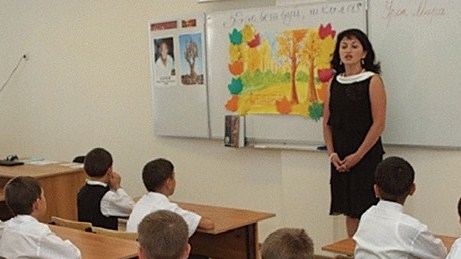Challenge
The education sector is one of the key priorities of Russia’s development aid efforts, a confirmation of the country’s commitment to the Millennium Development Goals (MDGs). Although Russian authorities put a strong emphasis on international development aid, the local capacity to measure educational quality and build policies based on those measurements needed to be improved. Russia established the Center of International Cooperation for Education Development (CICED), which became the focal organization for the delivery of the READ RAS program.
The main challenge for Russia has been to consolidate a variety of diverse activities in education quality improvement, such as the delivery of extensive training programs and capacity building, strategic planning, and the continued knowledge sharing and promotion of Russia’s expertise globally. In order to progress on these efforts, it was necessary to build the capacity of CICED and an associated network of experts and institutions.
Solution
The READ RAS program 2008–14 focuses on education quality through: (i) the building of technical, institutional, and organizational capacity in Russia for development aid in education, (ii) training and knowledge-sharing activities for Russian experts, and (iii) “learning by doing” activities for Russian experts of developing countries to build their knowledge of ways to measure and improve learning outcomes and their awareness of the constraints that developing countries face.
The program was designed to boost Russia’s domestic capacity gained through its participation in international and national initiatives on measuring learning outcomes. CICED serves as a coordinating agency for the Russian network of educational development aid experts.
The Bank’s technical assistance fostered CICED’s institutional strengthening, which facilitated international knowledge transfer and links between Russian and international experts. The RAS also supported graduate-level programs within Russian universities and the Russian Training Center to provide short-term training activities for Russian and international students.
Results
As a result of this extensive program from 2008 to 2012 (Phases 1 and 2):
- The CICED has become an internationally recognized agency with strong connections to development partners in Russia and abroad (the Learning Metrics Task Force, the German Society for International Cooperation [GIZ], the Global Partnership for Education [GPE], etc.
- Two master’s degree programs were established and delivered to 80 students.
- Seven courses designed by the Russian Training Center were delivered to 139 Russian and Commonwealth of Independent States (CIS) experts.
- Two national instruments to measure learning outcomes are being developed: (i) an information and communications technology (ICT) literacy test was tried out in Thailand and Armenia, and applied in the Tatarstan region of Russia; and (ii) the Student Achievement Monitoring instrument (SAM) is being implemented.
As a result of the capacity building under this RAS, CICED has recently won a competition in the GPE’s Global and Regional Activities (GRA) program and was awarded a grant of US$1.8 million to deliver an international study on students’ reasoning skills.
Partners
There is a strong partnership with the Ministry of Finance of the Russian Federation and the Center for International Cooperation in Education Development.
Moving Forward
As the program is being finalized in 2014, both the Ministry of Finance and the Bank are prepared for continued collaboration within the READ II program, which would include new and broader activities to enhance the technical capacity of Russia in the delivery of international educational development aid.
Beneficiaries
The Russian expert community in education from across the country, students of master’s programs and short training courses, and experts from CIS countries are among the beneficiaries of this RAS.

